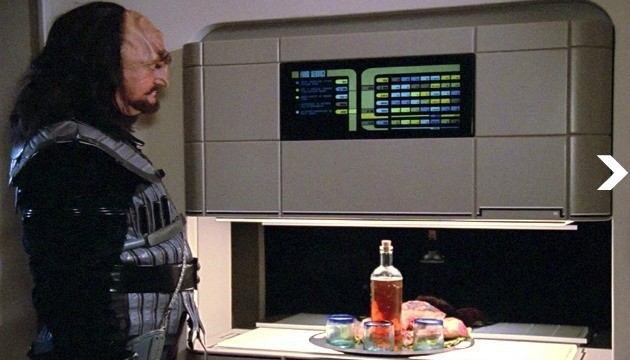
Posted on 02/24/2015 9:34:40 PM PST by Citizen Zed
As an example, Sisko's father runs a restaurant. Seats at that restaurant have to be a finite resource (because they require labor), so they would not be “free” to everyone—the owners get to choose whom they give it to. (That brings up the interesting question of whether the Federation would have anti-discrimination laws, but I digress.) Let's say Sisko chooses to feed people in his neighborhood; choosing to live in that neighborhood is the “price” his customers pay for his food. Similarly, Picard's brother makes real wine; since that requires real grapes and, again, labor, that would also be a finite resource (as opposed to synthehol, which is free to everyone). From the context, it seems likely that Picard the elder distributes his bottles to friends and family; a relationship with him is therefore the “price” of a bottle. However, he would likely also distribute bottles in “reputation trade,” so if you run an outstanding French restaurant, Picard would like choose to supply you with bottles. In return, as a courtesy to a great vintner, the Picards can likely get a table at every great restaurant in France whenever they like.
So in the Star Trek universe there are motivations to “make something of yourself”—you demonstrate that you are a worthwhile person, which would make others more inclined to befriend you (and thus give you the fruits of their labor) or jump you to the top of waiting lists for things like real wine, spots at a restaurant or a theater show, pieces of art, human-designed clothing, etc. It's clear that Starfleet personnel are very high status and thus are cosseted in most places and given first access to things of this type; this would be a huge motivation for joining Starfleet.
(Excerpt) Read more at slate.com ...

It takes an awful amount of energy to get the antimatter.
That would explain why the Maquis and a lot of colonists had gardens. The replicator may have “free” stuff for those on welfare, but you have to work doing maintenance on equipment or caring for human needs to get the better stuff. Or else you work for it by making items in the real world.
Kind of like the “dole yeast” in Larry Niven’s books, enough to keep you alive if down and out but no one liked to eat it.
Babylon 5 had a realistic universe with trade, oppression (Psy-corp, Narns), religion, plus character arcs that spanned the entire season. Londo going from throw-away ambassador to emperor, G’Kar from struggling to his people to literal savior who walks away from the kingship, Talia/Lyta from loyal member of the core to the one who leads the revolution.
I thought it was interesting that Ivonova was a Russian Jew, struggling at several points with her faith, like telling a visiting rabbi the alien food was allowed because the Torah didn’t forbid it. In contrast, everything Roddenberry did was atheist or anti-theist; that is even true of the “Planet Earth” pilots.
I should buy that series. I think I have seen an episode, but it didn’t seem interesting to me.
actually, advanced local solar could do it; or generators and microwave relays out by the solar corona itself? Or some entirely new process like Mr. Fusion? Cold fusion. I have not thought about this for awhile....
You can also pay per episode on Amazon instant video.
Yet another example of the pitfalls of a diversity pick!
Of the five television series, four of them dealt mainly with Starfleet personnel and their dependents. The other one, Deep Space Nine, featured civilian business owners, mainly a restaurateur and a tailor. Aside from their extracurricular activities, both of them provided something handmade in an era of perfect replication. There is also the question of exchange. In the series, they used something called Latinum, which was used informally, as well as for exchanges that the participants did not want tracked.
Trying to see the world of the 24th century on the Star Trek series would be like trying to view the early 21 21st century exclusively through NCIS.
In years past I let my young’uns sit in my lap and steer the truck.
In a parking lot at 10 mph; not so much on the Interstate at 80.
The point freedumb is making is while in a battle to the death a child was at the con.
Once you have replicators most of your population becomes unemployable, but providing for them is very easy. So yes, it’s a welfare state.
The Star Trek economy is a Gene Roddenberry fantasy.
It has nothing whatsoever to do with anything even faintly resembling reality.
The irony of a fabulously wealthy man imagining such a childish socialist nonsense is stunning.
>>With the introduction of the replicator, anybody could make anything. Except Captain Kirk<<
Are you kidding? Captain Kirk could make ANY WOMAN!
Star Trek never even really tried to show how their economy works.
I would assume they do indeed still have money, used for all luxuries, including eating at a restaurant.
But why anyone would still cook when you can push a button and get any food you want is beyond me.
Okay what that say about Fergeni
HELLO they are most Capitolist aliens in Star Trek universe
Details, shmetails... WHY worry about details when you have a Phaser Mark II that you can set to Stun?
HA HA that so true LMAO
nobody ever showers, shaves or uses a toilet...
The basis of the Star Trek economy is unlimited energy availability resulting in unlimited goods.
Economics is the study of scarcity, of which there was none, either in material goods nor in energy.
Disclaimer: Opinions posted on Free Republic are those of the individual posters and do not necessarily represent the opinion of Free Republic or its management. All materials posted herein are protected by copyright law and the exemption for fair use of copyrighted works.